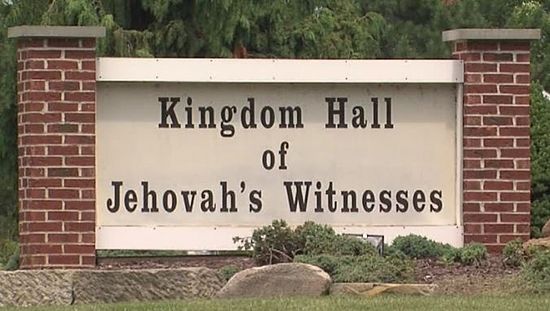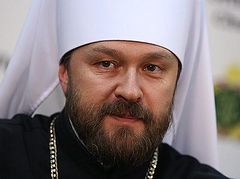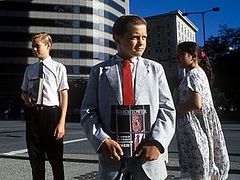Moscow, July 19, 2017
The Supreme Court of the Russian Federation upheld on Monday the decision to recognize the Jehovah’s Witnesses as an extremist organization, banning their operations and liquidating the organization within Russia, reports Interfax-Religion. The decision drew a rebuke from the European Union, contradicting the Russian court’s decision and insisting upon the Jehovah’s Witnesses right to peaceably worship and carry out activities in the country.
“The April 20, 2017 decision of the Supreme Court of the Russian Federation, which satisfied the requirements of the Ministry of Justice of the Russian Federation on the liquidation of the ‘Administrative Center of the Jehovah’s Witnesses in Russia’ remains without change, the appeal is without satisfaction,” reads the ruling of the appellate board of the Russian Supreme Court.
Thus, the ruling on the liquidation of the Jehovah’s Witnesses has come into force, although representatives of the organization continue to maintain that they never engaged in any form of extremism.
“The Jehovah’s Witnesses (from their moment their publications were included in the list of extremist literature) were reading and discussing the Bible. They didn’t use any extremist literature, because they simply didn’t have any—the books were destroyed by the faithful themselves, because the restoration of their rights had become too prolonged. If some examples remained, it was only in the house of the faithful, and not for distribution, but for personal reading,” said the organization’s lawyer Anton Omelchenko. He claims that the police in fact planted the literature in question at their public sites.
The lawyer also added that sometimes the recognition of certain literature as extremist does not hold up to scrutiny, citing an example from Rostov in September 2009, when, according to him, the book Does God Really Care About Us? was deemed extremist because of the phrase, “Why do the majority of those who call Jesus Lord not do the will of his Father?”
According to the appellate court’s announcement, the court of first instance, which liquidated the religious organization in Russia, made its decision based on the repeated administrative infractions of the local branches by distributing banned literature, and also that some local centers had already been liquidated.
“The relevant facts of any association’s governing or coordinating body, as well as the facts of carrying out extremist actions by at least one of its structural units, can serve as the basis for liquidating it for carrying out extremist acts,” reads the resolution of the court of first instance.
Another lawyer for the Jehova’s Witnesses, Victor Zhenkov, brought forth several instances of gratitude being shown to local branches of the organization by local authorities, saying, “Do these good works really reflect an essence of extremism?” adding that the court’s decision devalues the fight against true extremism.
In turn, Russian Justice Ministry representative Svetlana Borisova asked to leave the decision on liquidation without modification.
“Despite all the complaints of carrying out extremist activities, and the carrying out of preventative conversations, the Administrative Center of the Jehovah’s Witnesses not only has not ceased its extremist activity, but also continues to insist that such activities have never occurred,” said Borisova.
According to her, the case materials contained proof that the local religious organizations were all part of one structure. “The materials of the present case contain proof of funds both from the administrative center, and funds directed through the local religious organizations to the administrative center,” said the representative of the supervisory authority.
“Arguments about a politically motivated persecution of the Jehovah’s Witnesses by the Ministry of Justice are considered untenable, because our legislation does not provide any kind of preferences… All religious organizations are equal before the law, regardless of how widespread or small the number of adherents to the confession,” Borisova emphasized.
The actions of the Ministry of Justice meet the requirements of federal law on countering extremist activities, according to her.
Meanwhile, the European Union is rebuking the Russian court’s decision, and insisting upon the Jehovah’s Witnesses right to exist and operate within Russia.
“The Jehovah’s Witnesses, like all other religious groups, must be allowed to peacefully exercise the freedom of assembly without interference, which is guaranteed by the Russian Federation’s constitution, and by Russia’s international obligations and international standards of human rights,” reads a statement by the press secretary of the European Foreign Policy Service, as issued by the EU embassy in Russia, according to Interfax-Religion.
“The decision,” of the Russian Supreme Court on July 17, “confirms the ban on the peaceful worship of the Jehovah’s Witnesses throughout the country,” the document reads. “This ban has already led to the criminal prosecution of Jehovah's Witnesses, to police raids in places of worship, deliberate arson, and other forms of oppression,” the document also claims.
The Russian Supreme Court declared the Jehovah’s Witnesses an extremist organization and banned its activities within the country on April 20, thereby abolishing the umbrella organization of the Administrative Center, as well as 395 regional offices. The organizations’ assets were to be turned over to the State Treasury.








“Here are people whom Hitler and Stalin put in prison for pacifism who are being accused of extremism, which is laughter through tears.”
@T.
That's because Russia doesn't have a North Korea style autocratic government that can ban anything over night with no concern for domestic or international repercussions.
Do the Russians not realize the potential for reprisal bans of Russian Orthodoxy as an "arm of the Russian state" in the West?